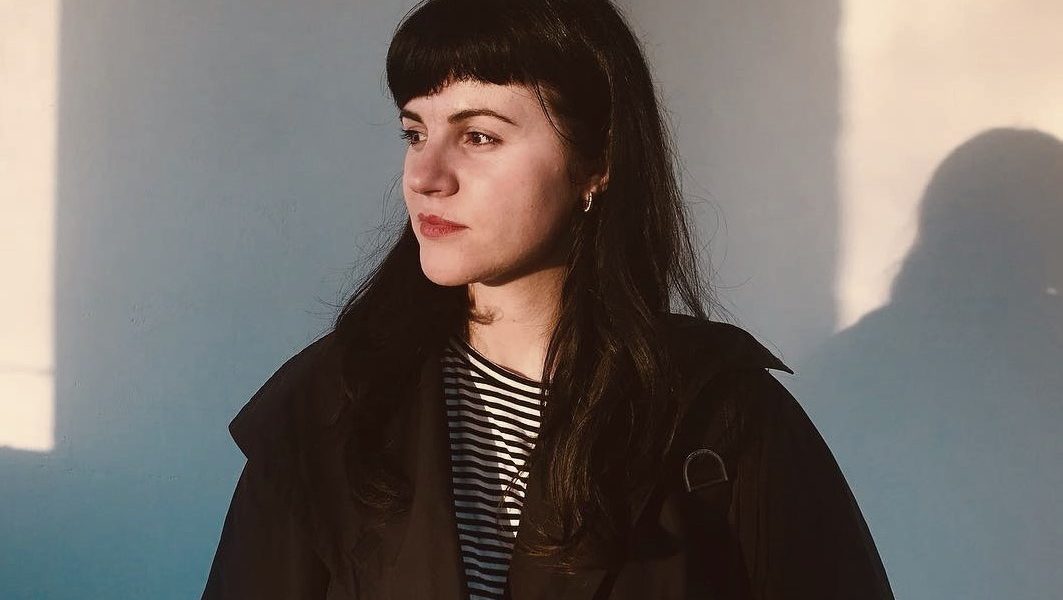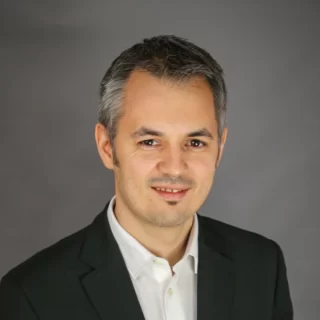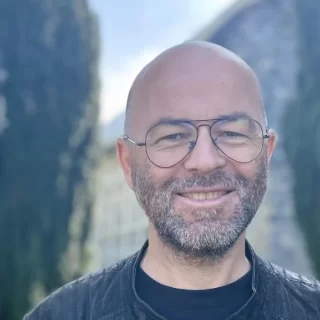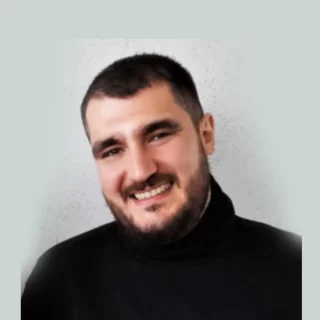“We used to say, ‘We were lucky to be kids during the war,’ a sentiment shared among us sisters, now adults, as we reflect on the unnaturalness and cruelty of wars. It’s a stark realization of the ugliest form human power can take. Today, we feel we understand war better—the dangers, the threats—but during the war in Kosovo, we ‘were lucky’ not to know any of this. The full scale of it. This would always be followed by “we wouldn’t know what to do if we were grownups, knowing what war was, we would surely go mad. We’d reminisce about those ‘unusual times’ of our childhood, finding moments of fun amidst the chaos. When our mother made us wear shoes when sleeping, we thought of it as an adventure, something we wouldn’t otherwise be able to do. And those times when we could eat the food that was usually kept for the guests only. The shelter that was built in our tractor’s trailer, to us it looked like a playhouse, we knew in which bag in there we could find peanuts, a rarity for the time. We would escape the house and run to the tractor, hiding from everyone at home, thinking the danger was at home, if someone saw us, not knowing where the real danger was; the bullets that could get us at any moment. My aunt in her twenties painting her beautiful face with dirt, to me was “part of the game”. We found ourselves in a hotel right after we crossed the border. We were seeing what a hotel looked like for the first time in our lives. For a kid, experiencing that was perhaps enough to distract us from the fact that we had just left our home, not just the house. We got free milk at that hotel. There were people bringing food for us.
***
Seems like I choose not to mention those other moments that I know very well, are ingrained in my memories. When Serbian forces entered our village, me and my elder sister, two years older than me, were not in our house with our mother. My father happened to be in Germany during the war in Kosovo, he had gone there a few years ago for work. When we heard the first gunshots, she was at home without us, with our third sister, a four-year-old kid in her hands when soldiers surrounded my mother while she was out, without her husband, a grown up, knowing what war was. I wonder how she managed to keep her sanity.
***
It was a sunny day, after many cold days, me and my elder sister decided to go visit our cousins. Everything seemed quiet. We had just recently bought new jackets, we wanted a reason to wear them outside, visiting our cousins was a good enough one. Our new jackets were bright red, with backpacks sewed on them, the inside fabric was this beautiful blue with beautiful figures. Those jackets were the definition of happiness to us, simply as that. I can still vividly remember how the jacket’s fabric felt on my body, the squishy noise it would make while walking.
***
We were in the living room with our cousins and some people who had come to stay there from the city, when the eldest woman entered the house screaming “they have entered the village, they killed my son”, she went up to the roof to look for her son who was out fixing electricity cables for the village. She wanted to see where they were coming from. Her daughter in law, the wife of the son she thought was killed, stood up, voiceless. It also seemed lifeless, even to us as kids, and started packing fresh bread from the oven into bags. They started packing their life away and didn’t even have to say a word, they, grownups, already knew what was happening, what war was. Me and my sister, seeing all of that, we knew something had happened, a change had started. One of the girls from the city who was staying there, around her 20s at that time, started screaming and I remember so vividly that scene of her putting her hands in her mouth trying to tear it apart. I probably thought that she was simply crazy. Now I know she was as crazy as I would be now if I knew “they were coming”.
***
It was my grandpa and youngest uncle who came for us. Grandpa was holding my sister and my uncle holding me. They would take a few steps on the street then enter every house along the street until we reached our home. Any moment could be the last for us. We didn’t know, me and my sister. They did. At this point, I think we already knew this wasn’t an adventure anymore. There was fear coming with each breath of my uncle. The look they would give to each other, grandpa, and him, they had to make sure they would make it home alive, with us. There was a chance of us never going home, and I felt that. And I just wanted to see my mother again. I can only now imagine what she went through those moments waiting for us, knowing she might never see us again. We reached home.
That night soldiers entered our home.
That same night, we left home, with that tractor that once was our playhouse, and went to the train station in Lipjan where people were pushing each other to make space there. Everyone wanted to go in, being left behind meant death. It was another war for survival while trying to escape another one.
***
On the train.
So many people. Kids peeing, people yelling, life was changing in front of us.
We went to Tetovo as refugees, in a beautiful city house, much bigger than ours in Kosovo. There were plenty of rooms in this house. We could see shops outside from one of the rooms’ windows. That was like the first holiday in our life, that’s what a holiday should look like, we thought. A new world. We would get boxes of chocolates and all we wanted to eat, something we were not very much used to. There was no prohibited food kept only for the guests there. And yet, something felt off. It was good for a while, but then memories of home started stirring our hearts, they were more powerful than anything we could get there. All we wanted to, even for once, was to go back home. There were no cows in this city. I gave up on chocolate and everything there, I just wanted to be able to go home, have our life back. But we understood we couldn’t. It’s like we had to agree to the fact that our home doesn’t exist anymore. But the more time passed, home became much more concrete and powerful in my mind.
***
News of Kosovo’s liberation brought hope. Kosovo was free, they said. It meant we could go home.
That day we took that combi to take us across the border, to go back home, that is still the happiest memory. The clapping, singing, and dancing on that combi, our shoes off, we felt free, without knowing what that meant at the time. Learning what it feels like to be free while crossing a border is a hard life lesson for a six-year-old. I never talked about war again. I thought I was over it when it was over.
***
Fast forward to 2017, almost 18 years after the war. I am in the USA for my master’s. Had a terrible mental breakdown and ended up in my first ever psychotherapy session. I am diagnosed with clinical depression. Something I had suffered throughout my adolescence, but thought was normal. I tried to finally talk about my feelings. Out of nowhere, the therapist asked me about my war experience, and I thought “on c’mon, I have long forgotten it, it can’t possibly affect my life or way of thinking now”. I burst into tears just as I was thinking that. Never went back after that session. Apparently, she had opened something I wasn’t ready to face yet.
***
2023, Zurich, Switzerland.
I am invited to talk about the movie “Hive, a movie portraying Kosovo’s women’s struggle to rebuild their lives after the war, with their husbands and most of the sons killed, and them having to deal with war sexual violence traumas. While the movie is playing, something in me hurts so much that I bawl my eyes out. It’s like going back to that first session, only that this time I really have to go back and participate in that panel. There’s no escape.
This was the first time I went to Switzerland. A country without a war in more than 500 years. People in the streets, I thought, and those in the audience, can never know the pain of the realization that peace and freedom cannot be taken for granted. That it can all be taken from you on a random sunny day while all you’re thinking about is your new jacket. And I think it was at that moment that it hit me, what war had done to me, to the six-year-old me. It had taught me a hard lesson, too harsh for a kid, so violently, that life as you know it, at any moment, can be taken from you. That it makes you want to tear apart your mouth, cover your face in mud, say goodbye to people and leave everything behind, because unwillingly, life as you know it, doesn’t belong to you anymore. And every little change in life can make you go back to that fear that you have repressed for so long, because you thought it wasn’t there to begin with. But it is, and it creeps when you least expect it. And in so many ways, war goes on…
Mirishahe Syla is a gender issues researcher and activist for gender justice, engaged in development projects in Kosovo. She currently works on a project focused on sustainable and inclusive economic development through job creation and private sector growth. Previously, she worked in the agricultural sector with the same mission. Mirishahe holds a bachelor’s degree in Political Science from the University of Pristina and a master’s degree in Women’s and Gender Studies from the University of Northern Iowa, USA. She is certified in ‘Gender and Economics’ by ETH Zurich and in ‘Making Market Systems Work’ by the Springfield Institute. Over the past decade, Mirishahe has addressed gender-based violence, women’s economic rights, and marginalized political participation. Her projects and campaigns in Kosovo have involved diverse groups, reflecting her commitment to inclusiveness. Her work is deeply rooted in feminist thought, shaping her roles as a development worker, project manager, researcher, publicist, and mentor.




